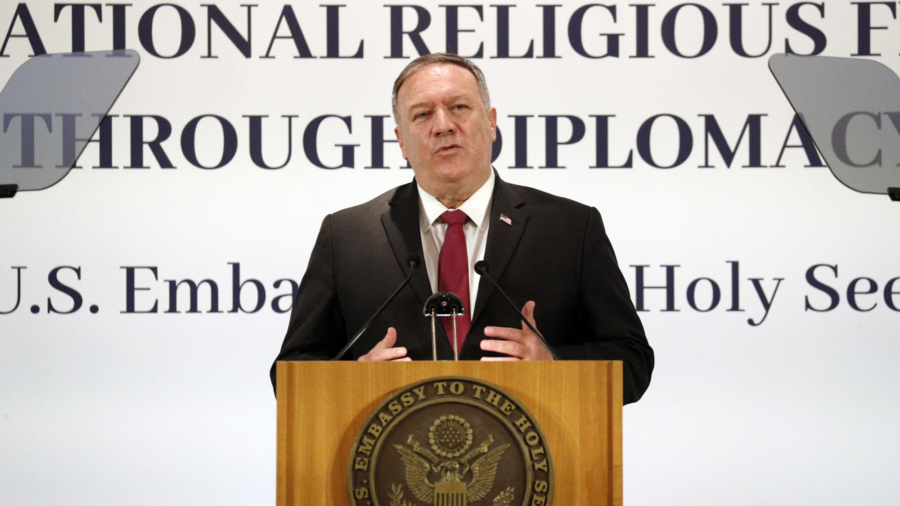U.S. Secretary of State Mike Pompeo urged the Vatican on Wednesday to join the United States in denouncing violations of religious freedom in China, saying the Catholic church should be at the forefront in the fight to insist on basic human rights there.
Pompeo made the appeal at a conference on religious freedom organized by the U.S. Embassy to the Holy See. It took place at the same time the Vatican is entering into delicate negotiations with Beijing on extending its controversial agreement over bishop nominations.
Pompeo called on the Catholic church to stand up for its followers who are oppressed for their beliefs by the communist regime in China. “Nowhere, however—nowhere is religious freedom under assault more than it is inside of China today. That’s because, as with all communist regimes, the Chinese Communist Party deems itself the ultimate moral authority,” Pompeo said in his speech at the conference.
The Chinese regime has desecrated and destroyed Catholic churches and shrines and imprisoned Catholic bishops like Augustine Cui Tai, priests, and laity including Catholic lay leaders in human rights movements in Hong Kong and other areas in China, Pompeo said.
“Authorities order residents to replace pictures of Jesus with those of Chairman Mao and those of General Secretary Xi Jinping,” Pompeo said.
A textbook approved by the Chinese regime for usage in vocational training schools across China has altered a passage it quoted from the Bible.

“The mission of defending human dignity—and religious freedom in particular—remains at the core of American foreign policy,” Pompeo said. Although the United States has spoken for those oppressed, used various measures to punish those responsible for the abuses, and urged others to join it in this advocacy, its “efforts are constrained by the realities of world politics,” Pompeo added.
However, “the Church is in a different position, [as] earthly considerations shouldn’t discourage principled stances based on eternal truths,” Pompeo said, citing the example of Father Bernhard Lichtenberg, a German priest who was imprisoned by Nazis and died in Gestapo custody for speaking out against the persecution of Jews by Nazis and helping the oppressed.
Pompeo also reminded how Pope John Paul II “played a pivotal role in igniting the revolution of conscience that brought down the Iron Curtain” and “challenged Latin America authoritarianism.”
“I urge all faith leaders to exhibit a similarly moral, bold witness for the sake of religious freedom, for human dignity, and for peace,” Pompeo said. “Christian leaders have an obligation to speak up for their brothers and sisters in Iraq, in North Korea, and in Cuba.”
“The Chinese Communist Party has battered every religious community in China: Protestant house churches, Tibetan Buddhists, Falun Gong devotees, as well as the Uyghur Muslims of Xinjiang and more. Nor, of course, have Catholics been spared this wave of repression,” Pompeo said.

“We must support those demanding freedom in our time,” Pompeo said. Citing St. John Paul II, retired Pope Benedict XVI, and Pope Francis, Pompeo urged a greater commitment from faith leaders to stand up for all religious believers.
“To be a church ‘permanently in a state of mission’ has many meanings,” Pompeo said, quoting Francis. “Surely one of them is to be a church permanently in defense of basic human rights.”
The Vatican’s secretary of state, Cardinal Pietro Parolin, also spoke in general terms about the Holy See’s longstanding defense of religious liberty. But he didn’t mention China or any country by name.
Earlier this month, Pompeo published an essay in a Catholic magazine, First Things, that sharply criticized the Holy See’s plans to renew a 2-year-old agreement with Beijing and suggested that the Vatican had compromised its moral authority by signing the 2018 accord with Beijing that allows the Chinese regime to appoint China’s bishops.
The Associated Press contributed to this report.
From The Epoch Times


